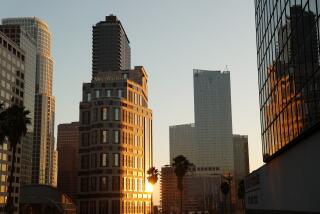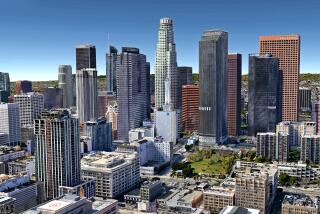Google leases Westside Pavilion as former shopping mecca transforms into tech offices
Last year, Google transformed the historic Spruce Goose hangar into a high-tech outpost to serve its ambitions to become a leading producer of Hollywood content on its YouTube platform.
On Tuesday, it took aim at another exemplar of 20th century American culture: the indoor mall — specifically, the Westside Pavilion.
For the record:
8:35 p.m. Jan. 8, 2019An earlier version of this article said Netflix is based in Mountain View, Calif. It’s based in Los Gatos, Calif.
The Mountain View, Calif., search giant will lease nearly all of the mall, which fell on hard times and is being made over, as it further expands its presence in Los Angeles.
The company will occupy 584,000 square feet of the prominent Pico Boulevard center, which owner Hudson Pacific Properties Inc. announced it is renovating into a stylish office complex with street-to-rooftop windows.
The property has been renamed One Westside as part of its radical renovation, which has been budgeted for as much as $360 million before Google starts adding its own improvements.
The Westside Pavilion was once one of the city’s premier shopping venues and a cultural touchstone for generations of Angelenos, appearing in movies, television shows and music videos. It played roles in the 1995 film “Clueless” and the video for musician Tom Petty’s 1989 hit “Free Fallin’.”
In recent years the mall, now mostly empty, fell behind flashier competitors such as the Grove and the refurbished Westfield Century City malls. The rise of online shopping also took a toll, and anchor department stores Macy’s and Nordstrom departed.
Hudson Pacific, a Los Angeles-based owner of office and studio properties, acquired control of the bulk of Westside Pavilion last year and announced that it would turn the sprawling three-story mall into offices.
“Google’s selection of One Westside demonstrates the strength of the Los Angeles tech and media industries, and exemplifies the type of creative office space that is in demand from large tech and media tenants,” Hudson Pacific’s Chief Executive Victor Coleman said.
Hudson Pacific had “multiple suitors” for office space in the converted mall, Coleman said, including companies in the media, finance and entertainment businesses.
Pictures in the News | Wednesday Jan. 9, 2019 »
Failing shopping malls have created both blight and opportunity across the country as landlords look for new uses for their properties including offices and housing. The Westside Pavilion was positioned better than most, Coleman said, because of its location in a prosperous part of Los Angeles near freeways and public transportation routes.
“I’m not so optimistic that it can be replicated” in other cases, he said.
Hudson Pacific and mall co-owner Macerich will finance the makeover of the property and deliver it to Google by the end of 2021. Google can be expected to spend millions of its own dollars preparing its space for occupancy in 2022. Financial terms of Google’s 14-year lease were not disclosed.
However, the Westside is one of the country’s priciest office markets, and Google will pay hundreds of millions of dollars in rent over the course of its lease. West Los Angeles landlords are asking for an average of $5.08 a square foot per month, far higher than the greater Los Angeles average of $3.37 a square foot calculated by property brokerage CBRE.
Planned improvements by architecture firm Gensler announced Tuesday include exterior terraces and patios with 15-foot-wide folding glass walls intended to create an indoor-outdoor environment for Google’s workers. It will have a rooftop garden deck and a bridge to the mall’s surviving movie theater.
The 12-screen Landmark Theatres complex will remain in the reconfigured complex, as will the Westside Tavern restaurant and other shops mostly on the ground floor along Pico and Westwood boulevards.
The outdoor parking lot on the south side of One Westside will be converted to landscaped park-like space where Google employees can work or relax outside of the office, Coleman said.
The new venture does not include the 215,000-square-foot Macy’s building in the mall, which the department store’s owner sold to Los Angeles developer Goldstein Planting Investments for $50 million in 2017.
One Westside, including the theater and remaining shops and restaurants, is owned by Hudson Pacific and longtime Westside Pavilion owner Macerich, which retained a 25% stake in the property after its sale. Macerich is a Santa Monica-based shopping center owner that also owns the Santa Monica Place mall.
Google has become one of the Los Angeles region’s largest office tenants as the Alphabet Inc. subsidiary joins other tech and entertainment giants in what Coleman once described as a “land grab” of office space to support their growth.
Google recently made another big real estate move when it transformed the historic Spruce Goose hangar in Playa Vista into a state-of-the-art office and production facility. Late last year, Google employees moved into new digs inside the hangar, where aviation pioneer Howard Hughes built his famous wooden airplane in the 1940s.
The hangar, leased by Google for 16 years, is owned by Japanese corporate investor ASO Group, which acquired it and several other nearby buildings for more than $300 million in 2016.
The properties are part of an ambitious project Google launched two years ago to build a campus of more than 450,000 square feet that will house office space and productions for its YouTube entertainment division. Google did not disclose which operations it plans to move into One Westside.
YouTube, which already has the world’s largest video library, has launched more than 100 original productions and introduced YouTube TV, a live TV service that includes channels such as CNN and Telemundo. It also has rolled out an $11.99 monthly music and video subscription service, YouTube Premium.
Google has had offices in Los Angeles since 2003, according to RG Kahoe, the company’s real estate project executive for the Southwest. “We’re excited to continue investing in the community,” he said in a statement Tuesday.
Real estate brokers have noted that the biggest drivers of office growth in the Los Angeles market are Facebook, Amazon, Apple, Netflix, Google and Snapchat.
“What we have seen over the last decade or so is the emergence of media and technology,” office real estate broker Daniel Rainer of CBRE said. “Everything is content driven.”
Streaming entertainment provider Netflix in October agreed to occupy a 13-story office tower called Epic that Hudson Pacific is building in Hollywood. When the building on Sunset Boulevard is completed a year from now, Netflix will occupy all 328,000 square feet.
Netflix, which is based in Los Gatos, Calif., already leases more than 400,000 square feet of office and production space across the boulevard at Hudson Pacific’s Sunset Bronson Studios. Netflix also recently agreed to lease an additional 355,000 square feet in a new office and retail complex under construction on Vine Street.
Amazon Studios, another streaming entertainment provider, has been snapping up space in Culver City, where it will occupy 530,000 square feet in Culver Studios, including the 1920s mansion on Washington Boulevard plus a new four-story office building called Culver Steps set to be completed in a few months.
The rise in demand has produced a market where blocks of office space in excess of 200,000 square feet are hard to come by and big players snap them up when they become available, Rainer said.
“It’s almost a defense mechanism to project your ability to move forward,” Rainer said of the big tech and entertainment tenants. “You are thinking about not just now, but the next decade and even longer.”
Twitter: @rogervincent
More to Read
Inside the business of entertainment
The Wide Shot brings you news, analysis and insights on everything from streaming wars to production — and what it all means for the future.
You may occasionally receive promotional content from the Los Angeles Times.











